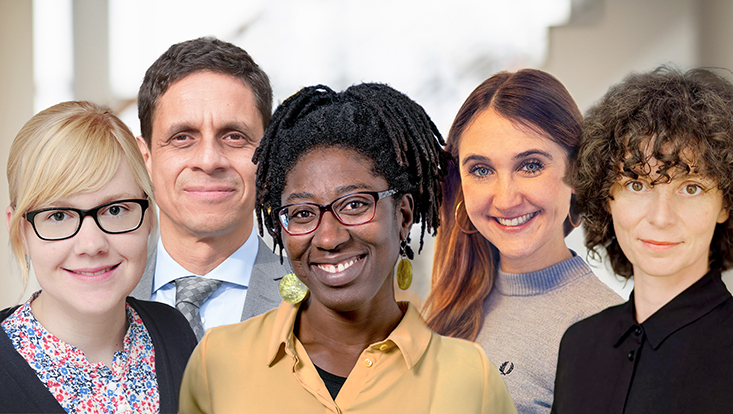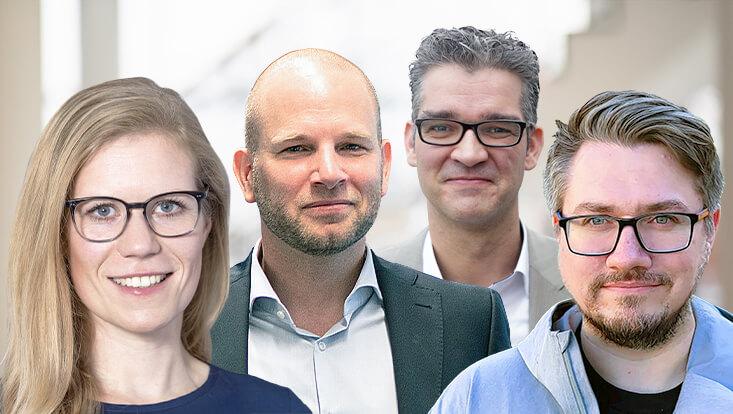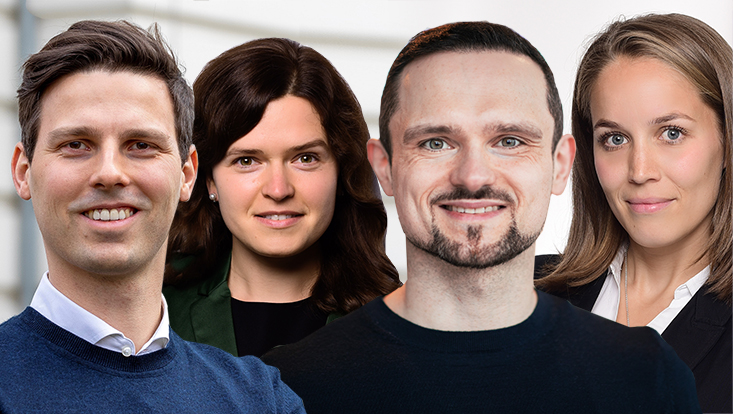After You Get Your Degree: Universität Hamburg Alumni on Their Path Towards a Career
11 April 2023, by Marie Schlicht / Anna Priebe

Photo: Studioline, BGW 2022, Miguel Ferraz, private, FH Potsdam/Andrea Hansen
Every year, thousands of students earn their degree here. Hundreds of doctorates are also awarded. And the career options available after that are many and diverse. In this series, alumni from various faculties talk about what they learned at Universität Hamburg and what advice they have for students. This time, we highlight 5 alumni from the Faculty of Education.
Education alumni
Gloria Boateng
- At the University: Teacher Training in Primary and Lower Secondary Education I (2002–2011)
- Today: Among other things, a teacher, moderator, author, and chair of the educational association SchlauFox e.V. For socioeconomically disadvantaged children and adolescents
After university, I did not at first know what to do next. I initially spent 2 years doing a doctorate, but then I quit because I noticed that I missed working with children and adolescents and I did not want to pursue research. So I went back to do my teaching practice period and the second Staatsexamen (state examination). Not much from my studies informs my job anymore but the little that does is very important—namely, the ability to reflect and self-reflect; in my profession as a teacher, the greatest challenge is still how to navigate the school system.
It was really a huge learning curve with regard to lowering my own expectations, because in real-life school conditions I could never have met them. That frustrated me for a long time. I would say that generally a large part of what someone needs to be a successful teacher is not or cannot be learned in your studies. Professionally, people need to prove themselves differently in many situations and it’s rather personality, hard work, and commitment that help. Thus, I would advise students to not take their studies too seriously; just enough to get a good degree. And in practice, bring your entire personality. And this closes the circle, because your studies can give a good boost to the development of your personality.
Dr. Meike Nieß
- At the University: Special needs teaching (2003–2008), doctorate (2010–2015)
- Today: Advisor for Berlin’s state representative for people with disabilities
My professional CV is not as straightforward as one might think at the beginning of one’s studies: After the Staatsexamen, I taught in Finland for a year and then did a one-year master’s program in disability studies in Great Britain. Before I became an advisor, I was a teacher at a place for people with disabilities and then I was a research associate at the human rights organization Deutsches Institut für Menschenrechte in Berlin. I knew what I wanted to focus on but not exactly with what kinds of jobs or activities it would be possible to do so or how to start.
I read a lot of job ads and applied for a lot of positions. Coaching at Universität Hamburg’s Career Center really helped me formulate and pursue my goals. Today, I write a lot—opinions on legislation, but also speeches and comments on behalf of the state representative for people with disabilities. I benefit from my special needs expertise and tap into this knowledge. It also helps me to read scientific publications and to be able to use findings for political positions. In hindsight, for me everything worked out despite many, including existential, worries and I found the job that I always wanted. Thus, I can only recommend studying what interests you, not giving up, and accepting detours as par for the course.
Marco Helms
- At the University: Education with a concentration in adult education, minor in psychology and sociology (1991–1998)
- Today: Department head in the area of prevention for the professional association Berufsgenossenschaft für Gesundheitsdienste und Wohlfahrtspflege (BGW)
Long before I completed my Diplom, I realized how broad the field of teaching is. I had a lot of practical experience in my studies, so I was able to gain work experience in international youth work and addiction counseling parallel to my studies. This made me well-prepared for professional life. This is also exactly what I would advise students to do: take a look early on at professional fields that interest you and get to know them through your own practical experiences.
After I did my Diplom, I first taught in a psychiatric hospital for the Evangelische Stiftung Alsterdorf. After that, I pursued continuing education because it became clear to me that I would like to work in HR and organizational development. I have been doing that now for several years with the BGW. In large organizations, structures are sometimes relatively inflexible and decisions need a lot of time. Mustering the necessary patience and endurance was a challenge—and you only really learn these kinds of skills on the job. What my studies prepared me well for: that in organizations, the various working areas constantly develop, for example, in the wake of digitalization or new types of working.
Prof. Dr. Tanja Salem
- At the University: Education (Diplom) with minors in sociology and psychology (2002–2009)
- Today: Professor of the theory and practice of childhood pedagogy at the University of Applied Sciences Potsdam
What do I really want to do? Where could I work well? I was already asking myself these questions during my studies. I know from my own experience that students from non-academic families often face hurdles when it comes to studying generally but also when it comes to orientation and participation in the academic system. Luckily, there are now more initiatives, advising, and scholarships and I can encourage any and everyone to take a peek at academia.
During my studies, I worked in various areas of teaching and as an undergraduate teaching assistant. This helped me orient myself professionally. That I would one day become a professor was not on my radar, but during my studies, I realized how important theory and research are for practical work. Today, as a professor, it is not my only goal to impart to students theoretical knowledge about (early) childhood education in a society of immigrants so that they can shape their own future teaching in an academically sound way; I also want them to be able to critically question their knowledge and practices and to develop further. It is especially important to me to help students recognize the educational backgrounds of young people and to take these as a starting point for their own teaching and advocate for them and their families.

Ann-Kathrin Gomolzig
- At the University: Bachelor’s in education (including early childhood) and a minor in sign language (2015–2019), master’s in education (including early childhood) (2019–2022)
- Today: Social worker with Jungenarbeit Hamburg e.V.
As a social worker, I oversee orientation courses for refugees who are living in shelters in Hamburg. Participants here learn German but also how to orient themselves in their new environment. This area is not traditionally part of early childhood education but I can apply a lot of what I learned in my studies to my practical work. My minor in sign language, for example, is a huge advantage, enabling me to communicate in different ways in my courses. It also helps a lot that I learned Arabic in an elective.
I can only encourage students to use this opportunity to get as broad an education as possible. You never know what might be useful later. I, myself, could also imagine having done a doctorate after my studies, and I applied both for positions in practical teaching fields as well as for a doctorate. Ultimately, I made my decision due to the better working conditions. At first, I was told that I was invited to an interview only because of the current shortage of workers and a degree in early childhood education was not ideal for social work. Initially, this gave me the feeling of not being qualified enough. But these reservations quickly dissipated. Teaching was already fun for me when I tutored during my studies, and I still enjoy it in my job.






